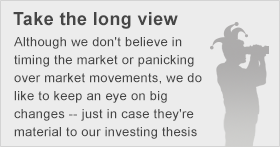
On the heels of yesterday's market rout, U.S. stocks opened lower on Thursday morning, with the benchmark S&P 500 and the narrower Dow Jones Industrial Average (^DJI 0.09%) both down 0.6 % at 10:15 a.m. EDT.
Whether the losses will persist through the day is a guessing game, but investors need to keep in mind that the stock market could certainly fall further if we use valuation as a reference. As of yesterday's close, the cyclically adjusted price-to-earnings, or CAPE, multiple championed by Nobel laureate Robert Shiller suggests the S&P 500 is overvalued by 49% -- an unusually high "margin of vulnerability" by historical standards. While I think that overestimates the gap with fair value, the CAPE has proven to be a reliable indicator of long-term value at its extremes (but note that it is worthless as a timing tool). Furthermore, it appears that the S&P 500 will get no help from bank shares today, with JPMorgan Chase (JPM 0.97%) reporting disappointing first-quarter results this morning and Citigroup (C 3.35%) in the headlines yet again for a supervisory lapse.

On the headline numbers, JPMorgan missed Wall Street's consensus estimates for both earnings per share and revenue, with EPS coming in at $1.28, 9% lower than the $1.41 forecast. Both revenue and EPS were also down from year-ago figures.
The culprit appears to be the corporate and investment bank unit, in particular fixed income markets, which suffered a 21% year-on-year drop in revenue. This activity produces volatile earnings, although there is some question whether part of the decline is tied to regulatory changes, including stricter capital requirements, which constrain profitability.
In a market that looks a bit richly valued, I continue to think that the major banks are a pocket of value; among them, JPMorgan looks particularly attractive. At 9.8 times next 12 months' EPS estimate, the shares are cheaper than those of its top five competitors: Goldman Sachs (10.3), Morgan Stanley (12.2), Bank of America (13.9), Citigroup (9.8), and Wells Fargo (11.8).
This is the world upside down: With significant commercial banking activity, JPMorgan's business model is less risky and its earnings less volatile than those of pure-play investment banks Goldman and Morgan Stanley, and, despite the spectacularly bad knock to its image from the "London Whale" trading scandal, it remains a higher-quality franchise than either BofA or Citi.
Consider, for example, that JPMorgan recently reduced its goal for return on tangible common equity from 16% to a range 15% to 16% (it was 13% in the first quarter); compare that to Citigroup, which recently told investors its 10% goal for the same metric in 2015 is now in jeopardy. Wells Fargo, which sticks to its lending knitting and is superbly well run, is the only one of the five that arguably deserves its premium over JPMorgan.








